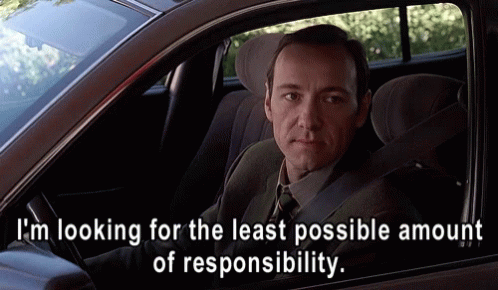Walking Downhill
It took me a few weeks to recognize my first midlife crisis – probably because I've been having existential crises of various flavors since I was eleven. The word crisis doesn't even really fit at this point, since it’s such a familiar feeling. Like being lost, but not sure where I’m even trying to find my way back to. Only the suspicious timing, taking place as it did soon after the birth of my first child, clued me in that this one was particularly linked to midlife. Because raising the next generation implies, there is only so much time left for this one.
Kevin Spacey in American Beauty living out one of film’s great midlife crises.
The term midlife crisis was introduced by psychoanalyst Elliott Jacques in 1957. Introducing the idea to a professional convocation, Jacques quoted an anonymous 36-year-old depressed therapy client’s description:
“Up till now, life has seemed an endless upward slope, with nothing but the distant horizon in view. Now suddenly I seem to have reached the crest of the hill, and there stretching ahead is the downward slope with the end of the road in sight—far enough away, it’s true—but there is death observably present at the end.”
Only later did Jacques acknowledge that the depressed 36-year-old therapy patient was himself.
Since then the midlife crisis has enjoyed a celebrated status in popular culture, despite a checkered and at times downright skeptical view from the psychological establishment. A true midlife crisis is defined not just as happening roughly between the ages of 35-50, but also by fear and uncertainty about the value of one’s time on this earth. Research findings reviewing the concept have varied enormously. Some academics have found a midlife crisis to be as common as affecting 80% of Americans, while others working with stricter methods and different samples posit it may only affect 10% of the populace. Research has also raised the question of whether midlife crises might be endemic to affluent Americans who have the time for such navel-gazing. Again, the Academy is divided.
Whatever the academy may think, the concept sticks around because it speaks to something that many of my therapy clients relate to. Anxiety and depression can find their inflection points in any developmental stage (see the related, more recently coined term “quarter life crisis”, which shows up in my office just as often) but the awareness of limited time that comes from cresting Jacques’ hill is uncanny and uncomfortable in its own unique way.
Elliott Jacques, coiner of the term midlife crisis, proud wearer of intensely clunky readers.
A midlife crisis can be triggered by something as simple as a birthday, or it can be a slower, more holistic fog that descends over weeks or months. Maybe it’s realizing that your career isn’t fulfilling. Maybe it’s a divorce, or similar disruption in a major relationship. Whatever the cause or causes, the common theme of a midlife crisis is that I only get so much time, and I’m not sure this is how I should be spending it.
Like many truths in therapy, this is both the source of a dilemma and the seed of its resolution, if you can muster the patience and courage to follow the labyrinth of thoughts and feelings to their core. Midlife crises signal that something is not fitting between the way we spend our time and what we actually see as important to a life well-lived… or at least that we worry this may be the case and need to take inventory to assuage that fear. We resolve our crisis by ensuring that we are living our life in a way that syncs outside activity with an internal compass of values and priorities.
While mazes have a variety of twists and turns that lead to numerous dead ends, labyrinths have only one path with the aim being not to fool the walker but to induce a meditative state. Which feels like the better metaphor of life to you?
Therapy can help you find a partner in this examination process, to better understand what is not working and what viable and responsible change looks like. As Seneca wrote, “It's not that we have a short time to live, but that we waste a lot of it.” (Dang, Seneca, way to call me out.)
Life’s brevity is both tragedy and distillation. It is only because we have limited time that the things we do are meaningful, because each one is costly. For example, if I focus on my family, it necessitates setting aside my career and creative pursuits, at least for a little while. And vice versa. Maybe love, whether for a person or an ideal, means being willing to give lots of something elses up. Our recommitments are beautiful because behind each one is the hundred sacrifices we make of roads not traveled, in order to say ‘yes’ to this one.
Having a midlife crisis and not sure what to do about it? Here are some things to try. It is reductionist and irresponsible to suggest that big, real, human problems can be solved with a list-acle of tips and tricks. And yet, you have to start somewhere.







